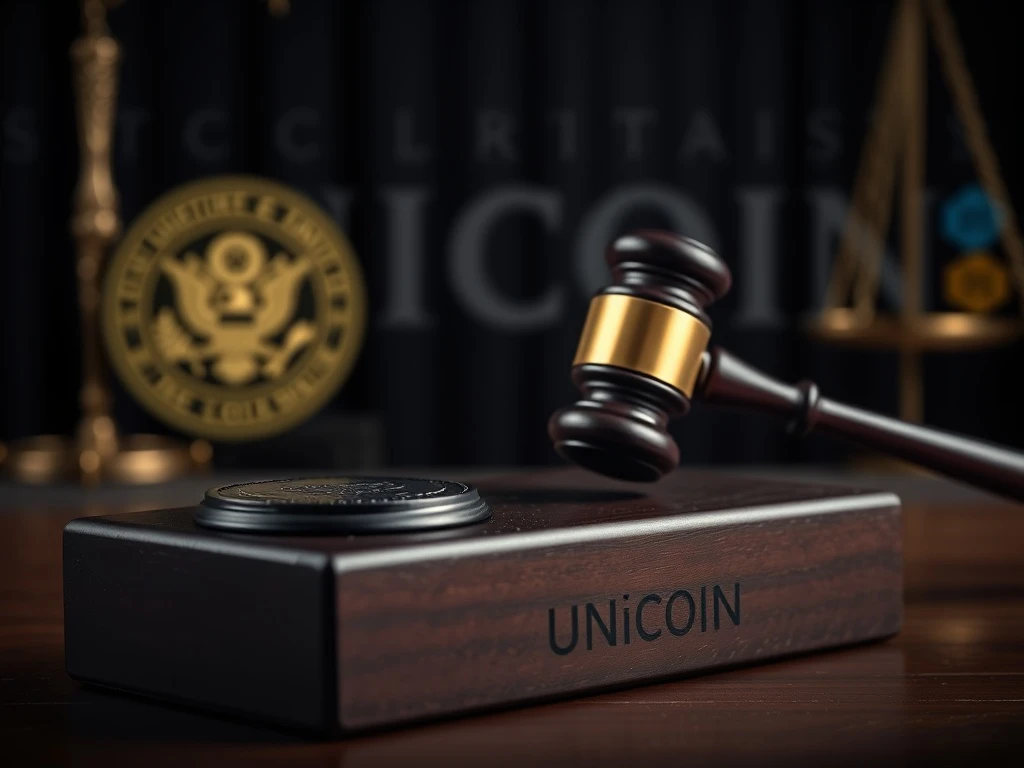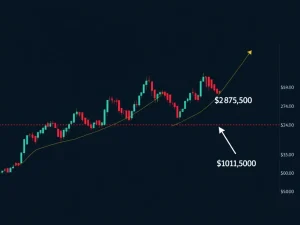Unicoin SEC Lawsuit: Company Fiercely Challenges ‘Distorted’ $100M Fraud Case

The legal battle between crypto investment platform Unicoin and the U.S. Securities and Exchange Commission (SEC) has escalated dramatically. Unicoin has launched a fierce counter-attack, urging a New York federal judge to dismiss the SEC’s substantial $100 million fraud case. This move marks a critical juncture in the ongoing Unicoin SEC lawsuit, as the company accuses the regulator of distorting its filings and relying on isolated ‘snippets’ taken out of context to build its allegations.
Unicoin’s Vigorous Defense Against SEC Crypto Fraud Allegations
In a significant legal filing, Unicoin pushed back against the SEC’s claims. The company argued that the regulator’s lawsuit should be dismissed entirely. According to Unicoin, the SEC ‘plucks snippets of communications and distorts their meaning and context.’ Furthermore, it ‘treats routine financial projection and optimism as fraud.’ The company also asserts that the SEC ‘ignores Unicoin’s sober warnings about risk.’ This aggressive stance highlights the contentious nature of the dispute. Crucially, Unicoin stated, ‘Most bizarrely, the SEC twists Unicoin’s disclosures in the company’s own SEC filings and improperly recasts these disclosures as proof of deception.’
The original lawsuit, filed in May, targeted Unicoin, its CEO Alex Konanykhin, board member Silvina Moschini, and former investment chief Alex Dominguez. The SEC alleged they raised $100 million. This was supposedly achieved through misleading investors about certificates. These certificates conveyed rights to receive Unicoin tokens and stock. Now, Unicoin’s defense seeks to dismantle these accusations. They contend the SEC’s interpretation of their communications is fundamentally flawed. Consequently, this legal challenge could set important precedents for future SEC crypto fraud cases.
The Standard of Proof: Unicoin Challenges SEC’s Claims
Unicoin argued that the SEC had merely ‘cobbled together’ its claims. It stated that the allegation of securities law violations required a higher standard of proof. The company emphasized, ‘Securities fraud demands more.’ It explicitly requires ‘a false statement, made with scienter, that reasonable investors would have relied on.’ Where the very risks identified by the SEC were openly and repeatedly disclosed, Unicoin asserts, those essential elements cannot be met. This is a critical point in the Unicoin fraud case.
The company further characterized the SEC’s lawsuit as a ‘shotgun pleading.’ This term refers to a complaint that fails to clearly identify specific claims against each defendant. Unicoin stated the SEC’s filing did not put forward a clear motive for the alleged actions. Instead, it relied heavily on circumstantial evidence. It also cited ‘semantics and mischaracterizations of statements taken wholly out of context.’ This suggests a fundamental disagreement over the interpretation of facts and communications.
Understanding the SEC’s Core Allegations and Unicoin’s Rebuttals
The SEC’s lawsuit centered on several key allegations of misleading statements. Specifically, the regulator claimed Unicoin misled investors by stating that billions of dollars worth of real-world assets would back its forthcoming token and rights certificates. These assets reportedly included real estate and equity in pre-IPO companies. However, the SEC alleged that these assets were, in reality, worth only a fraction of what Unicoin claimed. Furthermore, the agency contended that Unicoin misrepresented its overall financial situation. This is a common point of contention in crypto regulation news.
Asset Backing: A Crucial Distinction in the Unicoin SEC Lawsuit
Unicoin’s defense directly addressed the asset-backing claims. It argued that the SEC’s assertion relied on statements ‘taken wholly out of context.’ The company clarified that executives had consistently stated the *company* was asset-backed, not necessarily its *upcoming tokens* in a fully collateralized manner from day one. Unicoin stressed that ‘at no point did any Defendant claim that unicoins would function as a fully collateralized investment.’ This distinction is vital. It highlights the difference between a company having assets and those assets directly collateralizing a specific digital token. The company also argued that many statements were ‘forward-looking expressions of optimism.’ They reflected future goals rather than current, definitive facts. Such nuances are frequently debated in cases involving digital asset regulation.
The company also pointed out a significant practical challenge. The SEC’s lawsuit itself had prevented Unicoin from minting tokens and backing them with assets. Consequently, the lawsuit now seeks to hold Unicoin liable for ‘failing to create tokens that are fully collateralized by real-world assets.’ This creates a ‘catch-22’ situation for the company. Moreover, Unicoin asserted that the SEC had conflated the ‘deal and property value’ of its real estate transactions. Many of these transactions, the company claimed, were still in the process of closing. Some of these details, Unicoin noted, were even disclosed to investors.
Discrepancies in Sales Figures and SEC Registration Claims
Another major point of contention revolves around sales figures and regulatory registration. The SEC alleged that Unicoin falsely advertised having sold more than $3 billion in rights certificates. In stark contrast, Unicoin claimed it had only sold $110 million. This significant discrepancy forms a core part of the SEC’s fraud allegations. Such disparities are often scrutinized in detail during legal proceedings. The regulator also claimed Unicoin falsely advertised its tokens and certificates as ‘SEC-registered.’ This particular claim is highly sensitive. False representation of SEC registration carries severe legal consequences in the financial sector.
Unicoin, however, firmly denies these registration misrepresentations. The company’s defense suggests that the SEC has either misinterpreted or selectively presented information. This is common in complex legal battles. The outcome of this specific aspect of the Unicoin SEC lawsuit could significantly influence how other crypto projects communicate their regulatory status. Clarity in such communications is paramount for investor protection. Therefore, this legal tussle holds broader implications for the entire crypto industry and its interaction with regulatory bodies.
The Broader Impact on Crypto Regulation News and Digital Asset Regulation
The ongoing legal skirmish between Unicoin and the SEC is more than just an isolated case. It forms part of a larger narrative shaping crypto regulation news. The SEC has taken an increasingly aggressive stance towards the digital asset sector. It often classifies various cryptocurrencies and related offerings as unregistered securities. This approach has led to numerous enforcement actions against prominent companies. The industry, in turn, frequently criticizes the SEC for its ‘regulation by enforcement’ strategy. Many industry participants argue for clearer, more comprehensive regulatory frameworks. They believe this would foster innovation while protecting investors.
Cases like the Unicoin fraud case test the boundaries of existing securities laws. They highlight the challenges of applying traditional regulations to novel digital assets. The legal arguments presented by Unicoin, particularly concerning ‘forward-looking optimism’ and the distinction between company-backed assets versus token-backed assets, could influence future interpretations. Furthermore, the demand for a higher standard of proof for ‘scienter’ (intent to deceive) is a crucial aspect. It underscores the difficulty regulators face in proving fraudulent intent in complex financial instruments. Consequently, the resolution of this case will undoubtedly contribute to the evolving landscape of digital asset regulation.
Seeking Dismissal: What’s Next for the Unicoin SEC Lawsuit?
Unicoin’s motion asks the court to dismiss the SEC’s lawsuit ‘with prejudice.’ This legal term means the complaint would be stopped from being re-filed by the SEC. Such a dismissal would represent a significant victory for Unicoin. It would effectively end the legal challenge against them. Conversely, if the motion is denied, the case would proceed. This could involve discovery, further legal filings, and potentially a trial. The outcome remains uncertain, but the stakes are incredibly high for all parties involved.
The legal battle underscores the need for clear communication and robust compliance strategies within the crypto space. As the industry continues to mature, companies must navigate a complex and often ambiguous regulatory environment. The results of this Unicoin SEC lawsuit will be closely watched. They will offer valuable insights into the judicial interpretation of crypto offerings and the powers of regulatory bodies. Ultimately, this case contributes to the ongoing dialogue about how best to regulate the rapidly evolving world of digital assets.









